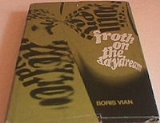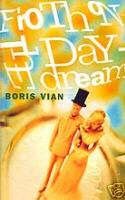
Froth on the daydream
Encyclopedia
Froth on the daydream is a novel
written by French
author Boris Vian
, and published in 1947.
It has been translated several times into English, under different titles. Stanley Chapman
's translation was titled Froth on the Daydream; Brian Harper's was titled Mood Indigo, Foam of the Daze (TamTam Books).
 The protagonist, Colin, is a wealthy young man with a resourceful and stylish man-servant, Nicolas, as well as a fantastic olfactory-musical invention: the pianocktail. With dizzying speed, Colin meets and weds Chloe in a grand ceremony. Generously, Colin bequeaths a quarter of his fortune to his friends Chick and Alise so they too may marry.
The protagonist, Colin, is a wealthy young man with a resourceful and stylish man-servant, Nicolas, as well as a fantastic olfactory-musical invention: the pianocktail. With dizzying speed, Colin meets and weds Chloe in a grand ceremony. Generously, Colin bequeaths a quarter of his fortune to his friends Chick and Alise so they too may marry.
Happiness should await both couples but Chloe falls ill upon her honeymoon with a water lily in the lung, a painful and rare condition that can only be treated by surrounding her with flowers. The expense is prohibitive and Colin soon exhausts his funds. Meanwhile, Chick's obsession with the philosopher, Jean-Sol Partre, causes him to spend all his money, effort and attention upon collecting Partre's literature. Alise hopes to save Chick financially and renew his interest in her by persuading Partre to stop publishing books. She kills him when he refuses and seeks revenge upon the booksellers. Colin struggles to provide flowers for Chloe to no avail and his grief at her death is so strong his pet mouse commits suicide to escape the gloom.
. Throughout the novel, there are references to various works by Sartre, but like the philosopher's name, Vian plays with words to make new titles for these works by "Partre". Sometimes he uses a synonym, such as Le Vomi (Sartre's original, La Nausée), and sometimes he uses a homonym, such as La Lettre et le Néon (The Letter and Neon), a pun on L'Être et le Néant (Being and Nothingness).
, Marie-France Pisier
, Sami Frey
, Alexandra Stewart
, Annie Buron, and Bernard Fresson
.
It was made into an opera under the same title
by the Russia
n composer Edison Denisov
in 1981.
It was also adapted as a Japanese film, released in 2001. English title: Chloe. Directed by 利重 剛 (Go Riju), it stars 永瀨正敏 (Nagase Masatoshi) with cinematography by 篠田昇 (Shinoda Noboru). It was selected for competition at the 2001 Berlin Film Festival.
Novel
A novel is a book of long narrative in literary prose. The genre has historical roots both in the fields of the medieval and early modern romance and in the tradition of the novella. The latter supplied the present generic term in the late 18th century....
written by French
France
The French Republic , The French Republic , The French Republic , (commonly known as France , is a unitary semi-presidential republic in Western Europe with several overseas territories and islands located on other continents and in the Indian, Pacific, and Atlantic oceans. Metropolitan France...
author Boris Vian
Boris Vian
Boris Vian was a French polymath: writer, poet, musician, singer, translator, critic, actor, inventor and engineer. He is best remembered today for his novels. Those published under the pseudonym Vernon Sullivan were bizarre parodies of criminal fiction, highly controversial at the time of their...
, and published in 1947.
It has been translated several times into English, under different titles. Stanley Chapman
Stanley Chapman
Stanley Chapman was a British architect, designer, translator and writer. His interests included theatre and pataphysics. He was involved with founding the National Theatre of London, was a member of Oulipo of the year 1960, founder of the Outrapo and a member also of the French Collège de...
's translation was titled Froth on the Daydream; Brian Harper's was titled Mood Indigo, Foam of the Daze (TamTam Books).
Plot summary

Happiness should await both couples but Chloe falls ill upon her honeymoon with a water lily in the lung, a painful and rare condition that can only be treated by surrounding her with flowers. The expense is prohibitive and Colin soon exhausts his funds. Meanwhile, Chick's obsession with the philosopher, Jean-Sol Partre, causes him to spend all his money, effort and attention upon collecting Partre's literature. Alise hopes to save Chick financially and renew his interest in her by persuading Partre to stop publishing books. She kills him when he refuses and seeks revenge upon the booksellers. Colin struggles to provide flowers for Chloe to no avail and his grief at her death is so strong his pet mouse commits suicide to escape the gloom.
Characters
- Colin – a wealthy young man
- Nicholas – Colin's man-servant
- Chloe – who Colin marries
- Chick – Colin's closest friend, who depends on Colin for financial support
- Alise – a friend of Colin who dates Chick
- Jean-Sol Partre – a philosopher whom Chick idolises (satirizing Jean-Paul SartreJean-Paul SartreJean-Paul Charles Aymard Sartre was a French existentialist philosopher, playwright, novelist, screenwriter, political activist, biographer, and literary critic. He was one of the leading figures in 20th century French philosophy, particularly Marxism, and was one of the key figures in literary...
)
Philosophical ideas
As noted above, in the original French version of the novel, Jean-Pulse Heatre is known as Jean-Sol Partre, satirizing the French Existentialist philosopher Jean-Paul SartreJean-Paul Sartre
Jean-Paul Charles Aymard Sartre was a French existentialist philosopher, playwright, novelist, screenwriter, political activist, biographer, and literary critic. He was one of the leading figures in 20th century French philosophy, particularly Marxism, and was one of the key figures in literary...
. Throughout the novel, there are references to various works by Sartre, but like the philosopher's name, Vian plays with words to make new titles for these works by "Partre". Sometimes he uses a synonym, such as Le Vomi (Sartre's original, La Nausée), and sometimes he uses a homonym, such as La Lettre et le Néon (The Letter and Neon), a pun on L'Être et le Néant (Being and Nothingness).
Adaptations
L'Écume des Jours was made into a film released in 1968. English title: Spray of the Days. Directed by Charles Belmont, it stars Jacques PerrinJacques Perrin
Jacques Perrin is a French actor and filmmaker. He is occasionally credited as Jacques Simonet. Simonet was his father's name and Perrin his mother's.-Life and career:...
, Marie-France Pisier
Marie-France Pisier
Marie-France Pisier was a French actress. She appeared in numerous films of the French New Wave and twice earned the national César Award for Best Supporting Actress.-Life and career:...
, Sami Frey
Sami Frey
Sami Frey, born Samuel Frei is a French actor. Perhaps his most famous films are En compagnie d'Antonin Artaud and Bande à part...
, Alexandra Stewart
Alexandra Stewart
Alexandra Stewart is a Canadian actress.Born in Montreal, Quebec, Alexandra Stewart left for Paris, France, in 1958, to study art...
, Annie Buron, and Bernard Fresson
Bernard Fresson
Bernard Fresson was a French cinema actor. He starred in over 160 films. Some of his notable roles include: Javert in the 1972 mini-series version of Les Misérables, Inspector Barthelmy in John Frankenheimer's French Connection II , Scope in Roman Polanski's The Tenant , Gilbert in Lover Boy , and...
.
It was made into an opera under the same title
L'écume des jours (opera)
L'écume des jours is an opera in three acts by the Russian composer Edison Denisov. The French text is by the composer based on the novel of the same title by Boris Vian...
by the Russia
Russia
Russia or , officially known as both Russia and the Russian Federation , is a country in northern Eurasia. It is a federal semi-presidential republic, comprising 83 federal subjects...
n composer Edison Denisov
Edison Denisov
Edison Vasilievich Denisov was a Russian composer of so called "Underground" — "Anti-Collectivist", "alternative" or "nonconformist" division in the Soviet music.-Biography:...
in 1981.
It was also adapted as a Japanese film, released in 2001. English title: Chloe. Directed by 利重 剛 (Go Riju), it stars 永瀨正敏 (Nagase Masatoshi) with cinematography by 篠田昇 (Shinoda Noboru). It was selected for competition at the 2001 Berlin Film Festival.
See also
- Le Mondes 100 Books of the CenturyLe Monde's 100 Books of the CenturyThe 100 Books of the Century is a grading of the books considered as the hundred best of the 20th century, drawn up in the spring of 1999 through a poll conducted by the French retailer Fnac and the Paris newspaper Le Monde....

